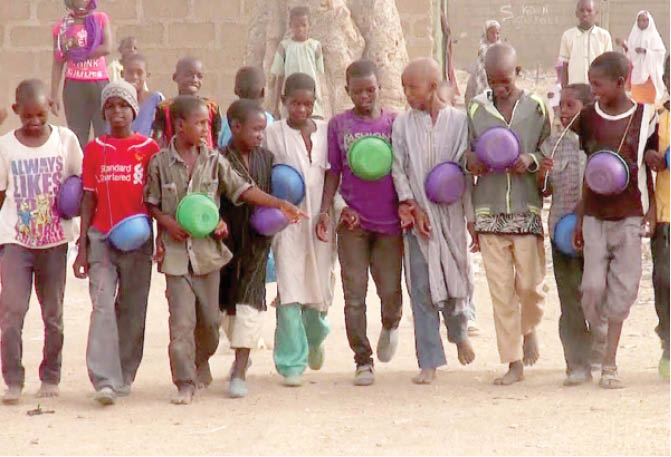What then could President Buhari have done for Northern Nigeria particularly by way of policies of enduring impact and legacy? It is never too late for the government to do good, so the president might as well start with ending or reforming the centuries’ old almajiri system of education in the north once and for all.
The almajiri child is perhaps the most deprived, dispossessed and vilified Nigerian. Nearly unlettered and unskilled, he is pushed outside of Nigeria’s mainstream society and political economy. His parents and teachers are often just as vulnerable and voiceless as himself. He is frequently accused of crime and terrorism, without evidence, of course, and of late, even his basic rights as a human being and as a citizen have been subjected to vociferous attacks. But the crimes of others against him are ignored, hushed up or outrightly dismissed.
- Only God can supervise Nigeria, Niger border – Buhari
- Second wave: Buhari asks govs to take over fight
In short, however you look at, almajiranci is today a system of social and economic deprivation, and therefore, a matter of social justice. If ever affirmative action were needed in Nigeria, it is for this group of citizens. So the only question worth asking, I assert, is what can be done about? How can we transform this system? That is a question of social and economic policy, and therefore of politics and political will.
A government with the required will to act needs first a new message for a massive and sustained social campaign, and then a new policy, or rather a new approach to policy that removes the most disagreeable aspects of the current system, such as street-begging and vulnerability to abuse, while retaining other aspects of it that people still find reason to value. But this requires taking into account both the history of the almajiri system of education specifically, and of education generally.
In the 19th century, almajiranci was a formal system of education with clearly defined levels of learning, content and curriculum, and according to some accounts, even school inspectors throughout today’s Northern Nigeria and beyond. It was funded collaboratively by the emirate state, the community, parents, donations and farming. There were boarding students as there were what we would now call ‘day’ students who lived in proximity to the tsangaya schools they attended, and so, importantly, street-begging was out of the question. The content taught and learned was predominantly religious of course. But at higher levels, fields such as language, literature, logic, and philosophy (of religion) were not uncommon.
Today’s almajiri system is a far cry from what is described above. So what changed? Why is the current almajiri system of education so unrecognisable from its illustrious progenitor described above? Well, colonialism happened, and with it everything changed, much like the way everything changed for Okonkwo and his community elsewhere in Nigeria.
First, the emirate state and its priorities changed. Where once almajiranci was the only formal system of education throughout Northern Nigeria, the advent of colonialism meant that it now had to compete with the new arrival: ‘boko’. Moreover, boko brought with it add-ons for the secular knowledge it imparted: certifications, jobs in government and the professions, a new language, and a social prestige not known before. The result was that almajiri education was pushed to the informal fringes of society. But, tellingly, not for everyone equally.
For the children of the elite and nobility, then and now, secular education was carefully defined as something in unity to the existing Islamic system of education. So the children needed to have both. For the children of the poor and the masses however, boko was defined as something in antagonism to religious education. So only Islamic knowledge mattered, for this life and the next. The legacy of this disastrous exercise in statecraft remains with us in the north and Nigeria to this day.
The rest, as they say, is history. And this is where a Buhari presidency, the ultimate champion of the poor, comes in. and with the right dose of political will, a sensible policy, and a new message behind it, there is hardly anyone better placed than Buhari to reform the current almajiri system of education, since nearly everyone agrees it requires reform. But what would such a reform look like? What would this new message and new policy look like?
The problem is that much of the controversy and debate in the press, as well as in the academic and policy literature about the almajiri system and how to reform it tends to represent almajiranci as something in a binary opposition to ‘Western education’, because of its Islamic religious content and traditional structure. Yet, any policy seeking to reform it now must reclaim some of the good things from its past.
‘Education’, however it was conceived everywhere, was primarily a religious affair in both structure and content. For more than one-third of its 900-year history, Oxford University, one of the world’s leading educational institutions, was primarily a place for learning about the Bible and Christian values, as was the first 50 years of ‘Western education’ in Nigeria too. Even today, Sunday schools and Islamiyyah schools still go hand in hand with our formal secular education in Nigeria.
So neither the religious content nor traditional structures of the tsangaya schools that the almajiri child attends should be a problem. And it is very possible to design a new policy that significantly reforms the almajiri system, as I shall try when we next meet.

 Join Daily Trust WhatsApp Community For Quick Access To News and Happenings Around You.
Join Daily Trust WhatsApp Community For Quick Access To News and Happenings Around You.

